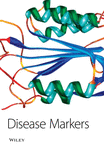Polymorphisms of Glutathione S-Transferase Mu 1 (GSTM1), Theta 1 (GSTT1), and Pi 1 (GSTP1) Genes and Epithelial Ovarian Cancer Risk
Abstract
Background: Exposure of ovarian cells to estrogen, which is detoxified by glutathione S-transferases (GSTs), has been associated with epithelial ovarian cancer (EOC) development.
Objectives: We tested in this study whether the GSTM1, GSTT1 and GSTP1 Ile105Val polymorphisms alter the risk of EOC.
Materials and methods: Genomic DNA from 132 EOC patients and 132 controls was analyzed by polymerase chain reaction and restriction fragment length polymorphism methods. The differences between groups were analyzed by χ2 or Fisher’s exact test.
Results: The frequencies of GSTP1 Ile/Ile (57.6% versus 45.5%, P = 0.03), GSTM1 null plus GSTP1 Ile/Ile (43.5% versus 25.8%; P = 0.03) and GSTM1 null plus GSTT1 null plus GSTP1 Ile/Ile (30.3% versus 7.7%; P = 0.007) genotypes were higher in patients than in controls. Individuals with the respective genotypes had a 1.80 (95% CI: 1.06–3.06), 2.38 (95% CI: 1.08–5.24) and 11.28 (95%CI: 1.95–65.30)-fold increased risks of EOC than those with the remaining genotypes.
Conclusions: Our data present preliminary evidence that GSTM1, GSTT1 and GSTP1 polymorphisms, particularly in combination, constitute important inherited EOC determinants in individuals from Southeastern Brazil.




